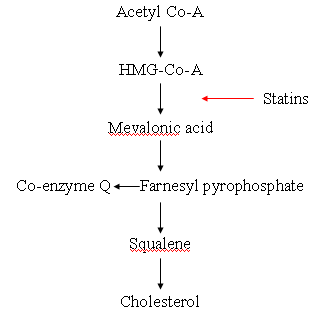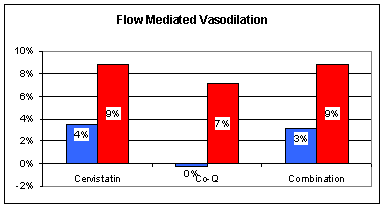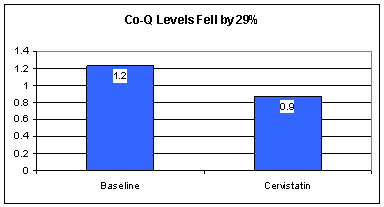Return to
Bioenergetic Support Page
Co-Enzyme Q10 and Statin Therapy
Co-Enzyme Q10 and Statin Therapy
- General Points
Statin Induced Diastolic Dysfunction - Reversible with CoQ10 Administration
Statin
Induced Myopathy - Reversible with CoQ10 Administration
Statin
Therapy +/- CoQ10 - Effect on Endothelial Function
Co-Enzyme Q10 and Statin Therapy
- General Points
Statin drugs waste Co-Enzyme Q10 - it's as simple as that.
If you take a statin drug, your CoQ10 levels will plummet, and this will
compromise the function of your heart. If you consider that CoQ10
supplementation has been shown to be of value in heart, brain, and kidney
disease and in athletes, then you can understand some of the side-effects of
statin therapy.
We can obtain CoQ10 from our diet, where it is present in brain,
liver, kidney, heart, and to a lesser extent muscle, of the animals we eat.
But neither evolution or our maker anticipated that we might become CoQ10
deficient, so if you are low in CoQ10 you can't make up increasing CoQ10
absorption from your diet. Unless you want to go on a high monkey
brain diet, you need to take a CoQ supplement if you are low in CoQ. If
you have established heart disease, or as discussed below, if you are taking a
statin drug, then you should be on CoQ10.
 CoQ10 is as
important to the body as is cholesterol. Every cell can make cholesterol
from carbon fragments of sugar and fat molecules that are not used to
generate energy. CoQ10 is synthesized on an off-shoot of the cholesterol
biosynthetic pathway, so if you can make cholesterol you can make CoQ10.
Statin drugs (HMG Co-A Reductase Inhibitors) block the production of cholesterol
by blocking the action of HMG Co-A Reductase. By poisoning this enzyme,
they block the production of cholesterol, and inevitably they block the
production of Co-Enzyme Q10 - thus:
CoQ10 is as
important to the body as is cholesterol. Every cell can make cholesterol
from carbon fragments of sugar and fat molecules that are not used to
generate energy. CoQ10 is synthesized on an off-shoot of the cholesterol
biosynthetic pathway, so if you can make cholesterol you can make CoQ10.
Statin drugs (HMG Co-A Reductase Inhibitors) block the production of cholesterol
by blocking the action of HMG Co-A Reductase. By poisoning this enzyme,
they block the production of cholesterol, and inevitably they block the
production of Co-Enzyme Q10 - thus:
Statin drugs compromise energy production in
the heart
Statins compromise energy production in every
cell of your body
The drug companies freely admit this, and then point out that
their original drug safety studies (carried out in young, healthy people, who
have plenty of CoQ10 - the initial safety studies were not carried out in people
with heart disease who will be CoQ10 deficient),
didn't show that this drug induced CoQ10 deficiency was a problem. Animal
studies have shown that statin therapy lowers blood and heart tissue CoQ10
levels by 50%. CoQ10 supplementation, provided along with statin therapy,
increased CoQ10 levels back to normal, without interfering with the
cholesterol lowering effects of statin drug therapy. These same studies
show that statin therapy, carried out without CoQ10 supplementation, decreased
cardiac function. Those of us who practice integrative cardiology or
nutritional medicine see people with statin induced pump dysfunction all the
time. The typical patient has some form of pre-existing heart disease,
often a cardiomyopathy. Even though coronary angiography demonstrates the
absence of plaque deposition, a statin drug is prescribed because the patient's
cholesterol level is above 200 mg/dl. Now, if you are 70 years old and
your arteries are normal, I just don't see the rationale for lowering your
cholesterol. If the cholesterol hasn't affected your vessels, do we really
need to put you on an expensive, potentially toxic drug to lower it? We
will, because statin therapy has become ingrained in American medicine, and in
American culture.
The TV adds are quite effective and you want something done so your doctor will
put you on a statin. The statin will lower your myocardial CoQ10 content,
which is low in the first place because you have a cardiomyopathy or some other
form of heart disease. As your CoQ10 level falls in your blood, within
your heart cells, and within the mitochondria of your heart cells, ATP energy
production will fall. Diastolic function, the ability of the hear to relax
and allow passive filling, is more energy intensive then is cardiac contraction,
and it will fall off first. Diastolic dysfunction due to statin therapy
creeps up on you and is often not recognized by your physician, but when you
start huffing and puffing on the golf course (and your physician can't "find
anything wrong"), then you know that you have it. Systolic function will
falter later, but this is typically seen (or recognized) only in patients with
pre-existent systolic dysfunction and a low baseline ejection fraction.
Statin induced pump dysfunction has been reported in the literature, typically
as case reports, and I see it not infrequently, but you will never see a
randomized, double blind study of statin therapy and pump dysfunction
because no one would pay for it and because it would be unethical. A
report was also published, showing that statin therapy compromised peak cardiac
performance in a young athlete. A study of CoQ10 in statin induced diastolic
dysfunction has been done and proves the point:
Statin Induced Diastolic Dysfunction - Reversible with CoQ10 Administration
This study looked at diastolic function, the ability of the heart to relax
and fill passively, in 14 individuals who were to begin statin therapy to
address an elevated blood cholesterol level. Cardiac echo measures of
diastolic function, the E:A ratio (a high ratio is good) and isovolumetric
relaxation time (a short time is good) were measured, before and 3 months in to
therapy with Lipitor at a dose of 20 mg/day.


Uh Oh - Diastolic function was compromised by statin therapy. They
don't talk about this much in the TV adds, but here it is, published in the
American Journal of Cardiology. 10 of the 14 patients had at least one
measure of diastolic function convert from normal to abnormal; the 4 who didn't
had higher pre-treatment CoQ10 levels. OK - we've demonstrated that statin
therapy compromises diastolic function - but can we reverse the problem with Co-Q10
supplementation? These statin treated patients were begun on CoQ10 at a
dose of 300 mg/day; the third column in the above charts gives you the result.
The problem was solved. We can give you statin therapy, but if we also
provide you with CoQ10, then you will not suffer from statin induced energy
deficiency. We do not have similar, published studies showing that CoQ
will predictably improve systolic function or ejection fraction in statin
treated patients, but I do see this in my practice. Statin therapy often
leads to an elevation in liver chemistries, likely on the basis of energy
dysfunction within the liver. Usually, but not always, liver chemistries
will return to baseline with the addition of CoQ10 and liver protective
nutritionals such as N-Acetyl Cysteine and Silymarin (known as Mild Thistle).
Muscle aching and fatigue, first involving the large muscle of the the truck and
thighs, is another common side-effect of statin therapy. I wonder why?
Statin
Induced Myopathy - Reversible with CoQ10 Administration
Forty one patients with muscle aching felt to be due to stain
therapy were evaluated in this study. The subjects were asked to rate
their pain on a 1 - 10 scale, and where then randomized to receive Vitamin E 400
IU/day or CoQ10 100 mg/day over 30 days, followed by a reassessment of their
muscle pain level.
Vitamin E had little effect. Statin myopathy is not due to
oxidative stress so we wouldn't expect Vitamin E to help much.
We would expect CoQ10 to have an effect, as statin side-effects are due
predominately to a drug induced CoQ10 deficiency state, and it did.
If you take a statin, and many of my patients do (statins have a
potent anti-inflammatory effect and if you have an inflamed circulation then
statin therapy makes perfect sense), then please take CoQ10 along with your
statin. This is only common sense. But what if you had to decide on
one or the other? What if your physician forbade you to take CoQ10? (and
our hospitals forbid its use) Because American physicians often behave
like elected representatives ("I'm not going to vote for that bill because it
was sponsored by a Democrat and I'm a Republican", and visa versa), you might be
told that if you take CoQ10, you will be released from their practice and cut
off from statin therapy. What would you do if you had to chose one or the
other?
Statin
Therapy +/- CoQ10 - Effect on Endothelial Function
Endothelial function, the ability of the endothelial cells that
line our arteries to generate nitric oxide, is the most important determinate of
short and long-term cardiovascular health. Nitric oxide, generated within
the endothelial cells from dietary arginine (in a chemical cascade that is
stimulated or enhanced by fish oil, folic acid, taurine, bioflavonoids, and
antioxidants), is the chemical that provides the "teflon coating" to our
arteries. Nitric oxide maintains arteries in a tonic, dilated state;
nitric oxide resists plaque development and abnormal platelet aggregation.
So far, all treatments (drug, nutritional, or physical, including EECP and
static magnetic field therapy) that
have been shown to improve short and long-term cardiac outlook have been shown
to improve endothelial health. Conversely, all cardiac risk factors,
conditions that increase your risk of developing coronary disease and/or increase
your risk for a cardiac event or poor outcome, have been shown to compromise
endothelial function. Measuring nitric oxide generation as a means of
assessing endothelial health is difficult. Instead we measure the ability
of an artery, any artery for that matter, to dilate in response to an
intervention that will increase nitric oxide production in a healthy artery.
In this study, flow-mediated vasodilation (normal is +12-15%)
was evaluated in twenty five patients with known endothelial dysfunction
(baseline flow mediated vasodilation < 4.5%). They received Cervistatin (a
statin agent), CoQ10, or both. Look at what happened.


Co-Q levels fell in response to statin therapy, as you would
expect. Statin therapy still had a therapeutic effect - endothelial
function improved, but at the price of CoQ10 depletion. Statin drugs do
help you, but they also hurt you. CoQ10 monotherapy also improved
endothelial function; actually it did a slightly better job then did
Cervistatin. CoQ10, functioning as an antioxidant, neutralizes the free
radicals that would otherwise degrade nitric oxide - thus CoQ10 improves
endothelial health. Combination therapy did just fine - endothelial
function improved and CoQ10 deficiency did not occur. Combination therapy
makes the most sense to me, and this is how I practice, but if you had to choose
one or the other, I would take the CoQ10. CoQ10 will not lower your
cholesterol, but in this study, its effect on endothelial health was equivalent
to that of a statin, and CoQ10 stimulates the enzymes that Mother Nature gave
you, while statin therapy poisons them.


James C. Roberts MD FACC
1/01/07
 CoQ10 is as
important to the body as is cholesterol. Every cell can make cholesterol
from carbon fragments of sugar and fat molecules that are not used to
generate energy. CoQ10 is synthesized on an off-shoot of the cholesterol
biosynthetic pathway, so if you can make cholesterol you can make CoQ10.
Statin drugs (HMG Co-A Reductase Inhibitors) block the production of cholesterol
by blocking the action of HMG Co-A Reductase. By poisoning this enzyme,
they block the production of cholesterol, and inevitably they block the
production of Co-Enzyme Q10 - thus:
CoQ10 is as
important to the body as is cholesterol. Every cell can make cholesterol
from carbon fragments of sugar and fat molecules that are not used to
generate energy. CoQ10 is synthesized on an off-shoot of the cholesterol
biosynthetic pathway, so if you can make cholesterol you can make CoQ10.
Statin drugs (HMG Co-A Reductase Inhibitors) block the production of cholesterol
by blocking the action of HMG Co-A Reductase. By poisoning this enzyme,
they block the production of cholesterol, and inevitably they block the
production of Co-Enzyme Q10 - thus: 




